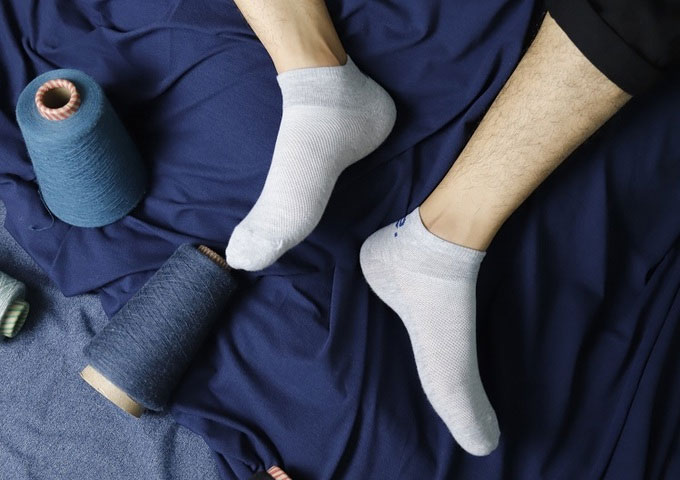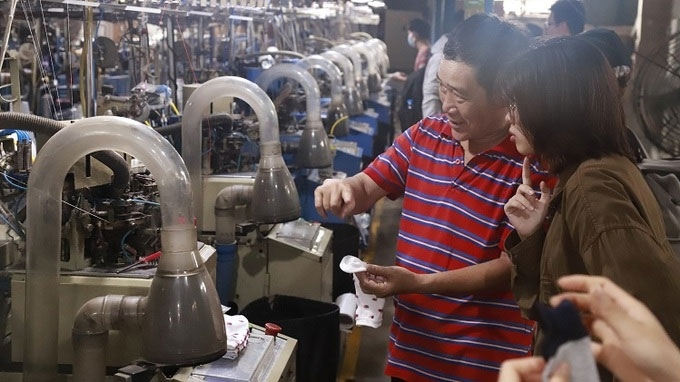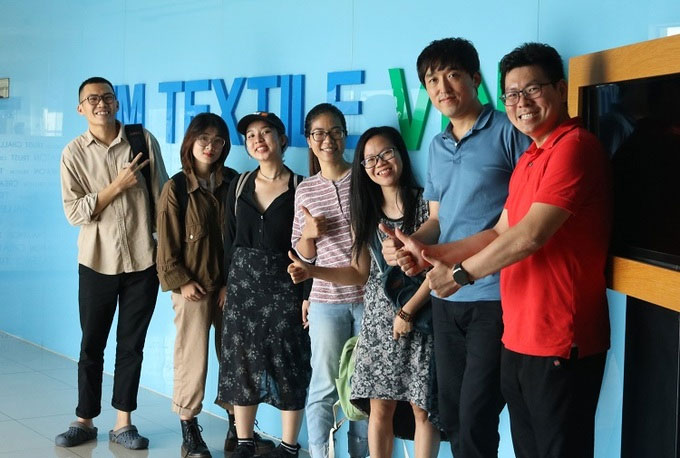The socks made by Bình and his associates from plastic bottles can be exported abroad at a price of 35,000 to 45,000 VND per pair, depending on the design.
Every Tuesday morning, Hoàng Quý Bình (26 years old) takes a bus from District 1 to the factory in Hóc Môn District, Ho Chi Minh City, to oversee the production of socks filled with his and his associates’ passion. Bình stated that these soft socks are made from the hard plastic bottles that are used daily.

Socks made from hard plastic bottles. (Photo: NVCC).
Bình, originally from Hải Dương, lost his father at the age of four. His mother taught him to be tidy and organized from a young age. Growing up, the habit of washing and reusing plastic bags and utilizing plastic and glass bottles as flower vases became commonplace in his home. Gradually, Bình realized that this approach not only saves money but also protects the environment.
In 2014, when he moved to Hanoi to study Mechanical Engineering at Hanoi University of Science and Technology, Bình noticed that many people did not have the habit of recycling paper and plastic bags. Seeing that there were not many activities in school to raise environmental awareness, in 2018, Bình connected with fellow students to establish the Green Life club, which exchanged paper and batteries for trees. In the first nine months of operation, the club selected old books for donation and built 100 school libraries. Used covers and notebooks were sent to a company specializing in processing to be recycled into biological roofing and notebook covers.
Once while researching online, he read an article about recycling plastic into fabric fibers to make socks. This method was applied in the United States and Australia, but Vietnam had not yet adopted it. “This is definitely the solution to the problem of handling the large amount of plastic bottle waste generated every day,” Bình thought. This time, instead of implementing the project in the North, he decided to move South to carry out the project named Re.socks. His associates are second and fourth-year students who want to change people’s awareness about the importance of daily recycling to protect the environment.
The process of realizing the idea was never simple; Bình and his associates faced difficulties in finding a manufacturing factory. He mentioned that sock factories often have preset production lines, making it hard for any unit to want to follow a custom process with trial quantities. After many searches and discussions, finally, a knitting factory agreed to collaborate with Re.socks to produce this product.

The Re.socks team visits the factory to learn about the sock knitting process. (Photo: NVCC).
The process of creating an environmentally friendly pair of socks begins with collecting plastic bottles and washing them thoroughly. The bottles are then cut into small pieces and melted to form plastic pellets, which are sent to the factory to be drawn into polyester fibers for weaving into products. Traditional polyester fibers are derived from fossil fuels and petroleum, while polyester fibers made from plastic bottles are recycled products that do not impact nature and help address plastic pollution.
“The first one or two products took on the shape of socks, but it still required three adjustments to the technique to make the fabric fibers finer and the product fit snugly at the heel,” Bình said, adding that three plastic bottles can be knitted into one pair of socks. To date, 10,000 pairs of socks have been created from 30,000 plastic bottles.
Wishing to bring the product to more people, Bình and his associates organized an event “exchange bottles for socks” this year, while also gathering feedback from users. “The product received many positive responses; the polyester socks made from plastic bottles have the advantage of being breathable, but they are limited in absorbency and do not pill or stretch when washed,” Bình noted.
In addition to the domestic market, Bình is exploring ways to connect with some stores in the UK and Australia. At the same time, the group is processing to apply for the Global Recycled Standard (GRS) certification from New Zealand to prove that their recycled products do not harm the environment and can be used safely.

Bình (far left) and his associates during a meeting with partners. (Photo: NVCC).
After months of waiting for feedback, Bình and his associates were overjoyed to receive the GRS certification and approval from stores in the UK and Australia to sell Re.socks products. He mentioned that the price of one Re.socks pair is the same in Vietnam and abroad, ranging from 35,000 to 45,000 VND per pair, depending on the design.
To give the product more meaning, 50% of the project’s profits are used for social activities to protect the environment. Bình stated that the group plans to incorporate coffee fibers so that the socks can absorb sweat and have antibacterial properties, aiming for a quantity of 5,000 pairs.
The group is also nurturing a project to utilize agricultural by-products (such as pandanus fibers, corn husks, and coffee) to recycle into fabric fibers, developing fashion from sustainable sources.


















































